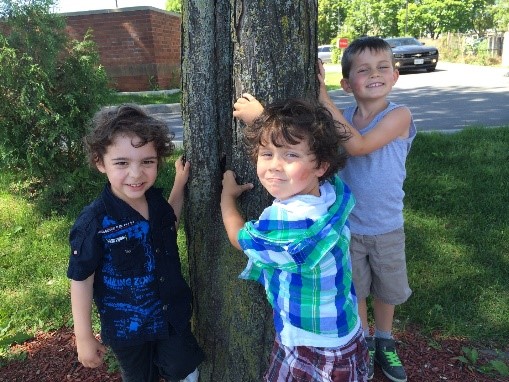The Lesson on Bloor Street
You could have heard a pin drop. Every eye at the conference was glued on Rick Tobias the director of Toronto's Yonge Street Mission as he shared Gabriel's story. The 6’4” Metis native grew up on a reserve in Ontario. His youth was spent exploring the great outdoors and at school he was a champion chess player. When he was a teenager, his younger brother asked him to go fishing but he declined and went hunting. Tragically his brother drowned. Blamed and traumatized, he became the black sheep of the family. This was the first of multiple tragedies that charted the course of his life.
During the Korean War he led a group of soldiers into battle and when most were killed, he was troubled with life-long guilt. Years later his wife and 12-year-old daughter died in a fire. He remarried but his second wife died of a heart attack.
Then came the final blow. Employed as a construction worker on skyscrapers his legs were accidentally bashed in and he could never work high steel again. This was the only pride he had left. Consumed by alcohol he became a skid row alcoholic on the streets of Toronto. The end came when he was beaten to death in an alley by a gang of street youth.
To be poor means having no keys. When you are on skid row you can only come indoors when people with keys let you in.
To be poor and homeless is to be emotionally broken. Gabriel was not a skid row alcoholic by choice. The events of his life battered, bruised, and broke him.
Gabriel taught Rick who the rich were. On one occasion Rick only had enough money to buy a piece of pizza for lunch. Walking out of the store he saw Gabriel on the street, hungry, and probably starving. He was tempted to give it to him but didn't. This made him realize that sometimes the difference between being rich and poor is a slice of pizza. And he added that to be rich in our global society is to have enough to eat.
Another lesson is the difference between true compassion and table scraps. On a cold February night, he was leaving the mission when he noticed Gabriel out in the snow with no shoes. Rick was wearing brand new boots, but he took them off and gave them to him. Initially he felt good but then realized he had only given his friend survival for another day. The boots did not give him hope, dignity or self-respect. They were only table scraps.
The director of the mission then pointed out that all the money we possess is Kingdom money and there are two choices for a person to make. The first is to accumulate more toys or help those in need. The second is to determine to what extent you are willing to give. Is it just enough for survival? Or will you give enough to help provide more than table scraps?
The next few sessions with different speakers went by in a blur. It was difficult to concentrate and when the last one ended, I left the conference with an aching heart. Visions of Gabriel embroiled in his lifelong struggle danced in my mind. Somewhat dazed I started the walk to my aunt’s condo on Bloor Street where I was staying for the week-long meetings.
And then it’s when I turned the corner onto Bloor that I saw her. A bag lady sitting on the sidewalk next to her meager possessions. Offices were closing for the day and steady streams of people briskly walked by. Intently she scanned their faces trying to make eye contact. But no one responded. Briefly ours met and I was overwhelmed. First by hopelessness. Then by helplessness knowing the only thing I could do was continue walking.
Supper that night was a feast. My aunt Lily was a gourmet cook and I often bragged I could smell her cooking from the 401. We had a pleasant visit but my mind kept drifting to Gabriel. The bag lady. Images of homeless people living on city streets. All I could do was pray for them. And this continued into the morning. Walking on Bloor back to the conference, with head tilted slightly, I was consciously praying for the homeless but was jolted into reality by a tap on the shoulder. A street person begging for some change to buy toast and a cup of coffee.
Quickly my mind shifted into gear. This was before the advent of late-night banks and corner money machines. All I had was a 20-dollar bill and it had to last for the week. After mumbling a regrettable apology, I faded into the distance.
Fashionable stores lined the street, and it couldn’t have been more than a dozen or so steps when it happened. Something compelled me to stop, turn, and look right into a display window. It was a bookstore and lying right in the centre was a Bible opened to James chapter one. A bright red arrow was taped on the page pointing to verse twenty-two which was boxed in by red tape. Leaning over I read these words.
This is the lesson on Bloor Street and as I unpack it, I urge you to consider its challenge.
Hearers. A hearer is someone who listens intently to the Word of God. He is familiar with stories from both the Old and New Testaments and knows all about the birth of Jesus, the cross, the empty tomb and the resurrection. Like a sponge he soaks up what he hears and processes it intellectually. But instead of activating his faith, he stores it away in his memory bank and stays rooted in the stage of listening.
Doers. The contrast of a doer is that in addition to processing what he hears, he leaps into action. The Bible becomes the guiding force in his life. Love is to be shared. Mercy is to be extended. Instruction is to be obeyed. Moving from the stage of hearing into the stage of doing he uses his gifts to serve God. And when he stands at the gates of eternity, he will hear these words, “Well done good and faithful servant,” and will be welcomed into the presence of God.
Deception. But the folly of a hearer has destined him to a different fate. According to James, he has seduced himself into believing that his faith alone policy is enough, and that he too will receive the same welcome.
But will he?
The answer is no. In his second chapter James clarifies why. Faith which does not express itself in action is not genuine. It’s an example of faith that has withered and died. It is lifeless. It is useless.
I was reminded of this one Sunday, shortly after I found a dime just outside the door to my church office. It was slithered in half. Perfectly. And I never discovered how it got there. To have some fun I included it in some change when making a purchase. But the cashier laughingly rejected it. Her reason when I asked why, was that a dime cut in half isn’t worth anything. It didn’t take long to make the connection.
Half a Christian like half a dime is worth nothing at all.
The tragic consequence for hearers rooted in the stage of listening is they will never meet Jesus, walk the streets of the New Jerusalem, or eat fruit from the tree of life. Lip service is not a gateway to the presence of God. It’s a gateway to eternal separation in the place called hell. This reveals why James ends the verse with a forceful charge.
Do what it says.
And he doesn’t leave us hanging. In his second chapter he states that you are doing right, you are putting your faith in action, when you are obedient to the royal law in the Bible. This is a reference to the law of love which stems from the two greatest commandments.
Love the Lord your God with all your heart and with all your soul and all your mind.
Love your neighbour as yourself.
And be reminded of this. Your neighbour is not just the person living next-door. He is anyone you encounter who is struggling. He or she can be a relative, a friend, a co-worker, or a stranger. A Gabriel. A bag lady sitting on a street corner. Or a beggar tapping you on the shoulder. Faith in action is balanced with works.
There’s a story about an old Scotsman who owned a rowboat. On one oar he painted the word FAITH in bold letters. On the other one he painted the word WORKS. One day he was rowing a passenger from one side of a river to the other and she asked him why? Instead of answering he began rowing with only one oar and the boat moved in a circle to the right. But when he changed oars, the boat moved in a circle to the left. Then he told her if we want to make it to the other side, we need to use both oars.
Using both oars is what Doers are called to do as they navigate through life. They are the handiwork of God, who have been set apart to live out the life of Jesus in the world. To serve him by sharing his love and compassion. To be salt and light in a world corrupted by sin. But the works they do are not to be confused with saving faith. The Apostle Paul addressed this in his letter to the Ephesian church.
For it is by grace you have been saved, through faith- and this not from yourselves,
it is the gift of God- not by works, so that no one can boast. (2:8-9)
God's gift of grace is a free gift. It can only be received through faith believing Jesus is the Son of God and receiving him as Saviour and Lord. Good works do not, and cannot, play a role in saving a person from sin.
The focus in James' letter is not works related to saving faith. It is works that follow conversion. And the message he conveys is that they are evidence of faith that is genuine. But if a person hears the Word of God and stays rooted in the stage of listening, his faith has died and it cannot save him from the judgment of God. This is why James, the half-brother of Jesus and the leader of the Jerusalem church, challenges every person who hears God's Word to do what it says.
In a nutshell this is the lesson on Bloor Street which echoes down to us through the annals of history. And it’s just as meaningful in 2021 as when it was written. If James were here today his charge might be similar to Nike's.
Just do it
******************************************
Four years later after the Bloor Street experience I was again in Toronto. It was Easter Sunday and my aunt Lily had just died in the hospital. Saddened, and immersed in thought about assisting with funeral arrangements, I was rushing to my car when it happened again. A street person approached me for a handout. Coincidently, but maybe not, I again only had a 20-dollar bill in my pocket.
Brushing him aside I started walking away but reality quickly sunk in. For Christians it was the most triumphant day of the year and I had just shared a message about the resurrection of Jesus. Turning around I called him back. First, we talked about our backgrounds then he showed me the Subway grates where he slept on cold notes. Before leaving I not only prayed for him, he prayed for me. And yes, I gave him the 20 dollars.









Comments
Post a Comment